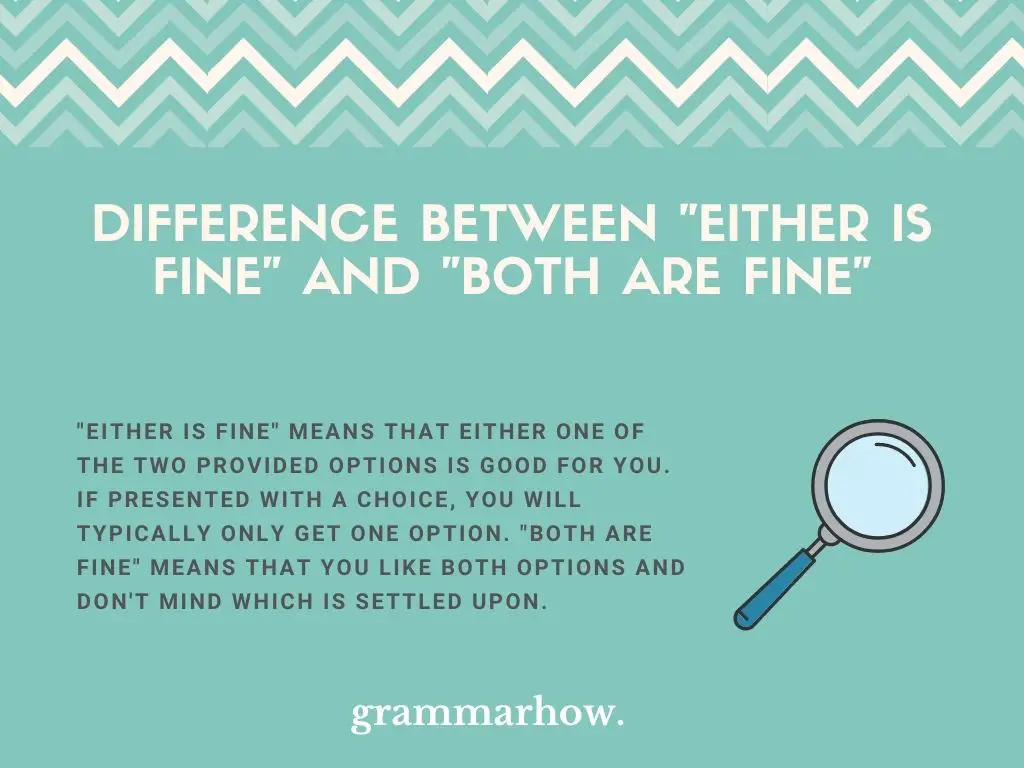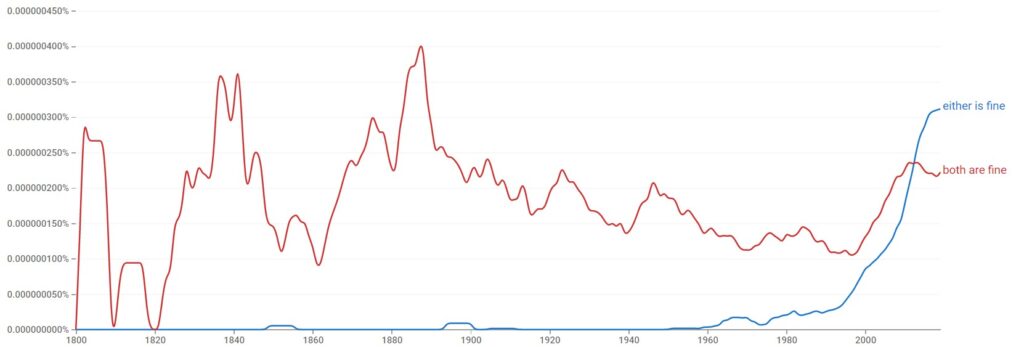The phrases “either is fine” and “both are fine” are similar but not identical. It would help to know how “either” and “both” interact with the meaning of a sentence while they both refer to two things. This article will explain what you need to know.
What Is The Difference Between “Either Is Fine” And “Both Are Fine”?
“Either is fine” means that either one of the two provided options is good for you. If presented with a choice, you will typically only get one option. “Both are fine” means that you like both options and don’t mind which is settled upon.

So, what does that mean? Well, let’s look into the following examples:
- Would you like strawberries or cherries with your dessert?
Imagine this question is asked. Now, we can answer it in two ways:
- Either is fine.
With “either is fine,” we’re giving a choice to whoever asked us. We’re allowing them to choose one of the options presented because we don’t mind either way.
- Both are fine.
“Both are fine” implies that you want both “strawberries” and “cherries.” This time, there is less of a choice for someone to make, and you intend on having both options.
What Does “Either Is Fine” Mean?
“Either is fine” means that you do not mind what the final decision is. We say this when we do not want to make a choice for ourselves, and it implies that someone else is allowed to make this choice for us.
Some people have a hard time coming to a decision. That’s why they might use “either is fine” to hopefully allow someone else to make that decision for them.
With this phrase, “fine” implies that we will not be upset no matter what decision the other person comes to. That could encourage them to make the decision that suits them better (if they have a preference).
What Does “Both Are Fine” Mean?
“Both are fine” typically shows that both provided options are “fine.” Again, we use “fine” to show that we do not mind whatever outcome is selected. However, it also implies that we would be happy with “both” rather than a decision being made.
Sometimes, it’s not possible to take both options. In these cases, we can still use “both are fine,” but it’s less common.
If you are asked for a specific decision between two, and you say “both are fine,” the asker will assume you mean that they can pick for you. This is identical to how “either is fine” works, and you need to make sure you know this before saying it.
Examples Of How To Use “Either Is Fine” In A Sentence
Let’s go over some examples of how you can use both phrases:
- I don’t mind which option you choose because either is fine with me.
- Either is fine, and I’d appreciate it if you could hurry up and make a decision.
- Either is fine, and I know I’m leaving it in good hands if I let you decide which one I get.
- I love both of those restaurants, and either is fine for you to book for our date tonight.
- I’m happy with either. Trust me; either is fine, and I won’t be upset no matter what.
- Either is fine, and I trust that you’ll make the best decision based on what will make you happy.
- It’s okay; either is fine with me. Don’t let the decision stress you out.
“Either is fine” allows someone else to make our decision for us. This works well when we aren’t happy to make our own choices. Usually, if we’re indecisive, we’d use a phrase like this.
Examples Of How To Use “Both Are Fine” In A Sentence
- Both are fine, and I’m sure you’ll figure out the best choice for us.
- Honestly, both are fine. You can leave them both here, and I’ll eat them.
- Both are fine choices, but I’m sure you’ll be able to come to a better decision on your own.
- Both are fine! Leave them there, and I’ll have them in a second.
- Both are fine, so you shouldn’t worry about which one you choose at the end of the day.
- Both are fine, and I’ll be happy to let you make the final choices.
- Both are fine, so stop worrying about it! It’s not worth it.
“Both are fine” can work the same way as “either is fine” if presented with two options. However, it can also mean that we’d rather take both options (if applicable), and we might want them both because we cannot decide ourselves.
Is It Rude To Say “Either Is Fine”?
It is not rude to say, “either is fine.” However, some people do think that indecisiveness of this nature is lazy and therefore rude. It depends mostly on who you are speaking to. Typically, “either is fine” works well informally more than formally.
If you’re going to use it formally, you must make sure you know your colleagues and bosses well (or whoever you’re speaking to). If they take offense to your indecisiveness, it could be a bad sign.
You may also like: 11 Better Ways To Say “Either Way Is Fine”
Does “Either Is Fine” And “Either Way Is Fine” Mean The Same?
“Either is fine” and “either way is fine” mean the same thing. We add “way” when two different options have been presented to us that usually come with different outcomes or scenarios. It’s just a slightly more specific phrase.
Here are some examples:
- Either is fine with me, and I’ll know you’ll pick the right place.
- Either way is fine because I don’t care much about the outcome.
As you can see, they are both interchangeable.
Is “Either Is Fine” Or “Both Are Fine” Used The Most?
Finally, let’s check out some statistics of which one is more likely.

According to Google Ngram Viewer, “either is fine” is more common but not by much. Also, it’s only gained popularity over the last few decades, while “both are fine” has been popular for quite a surprising amount of time in history.
You may also like:
“Fine By Me” vs. “Fine With Me” – Difference (With Examples)
How to Use “Either” and “Neither” for More Than Two Items
